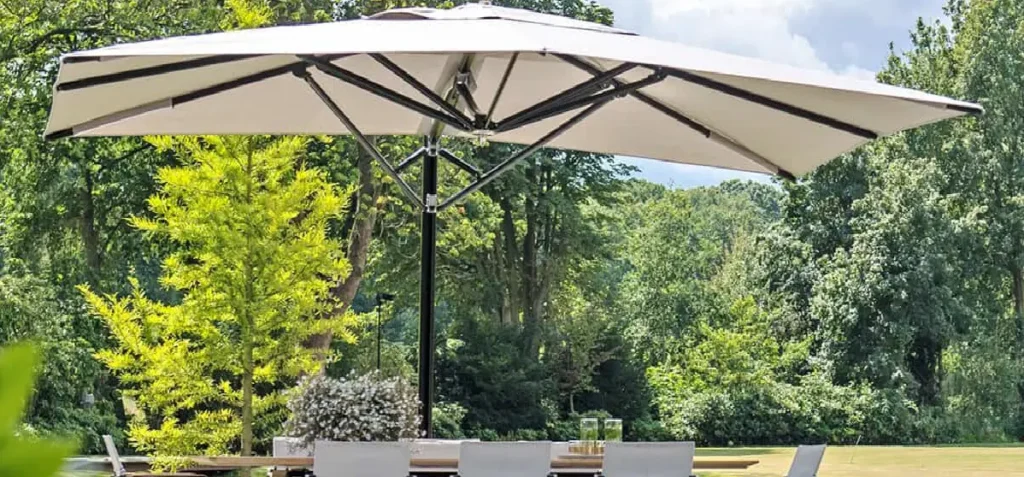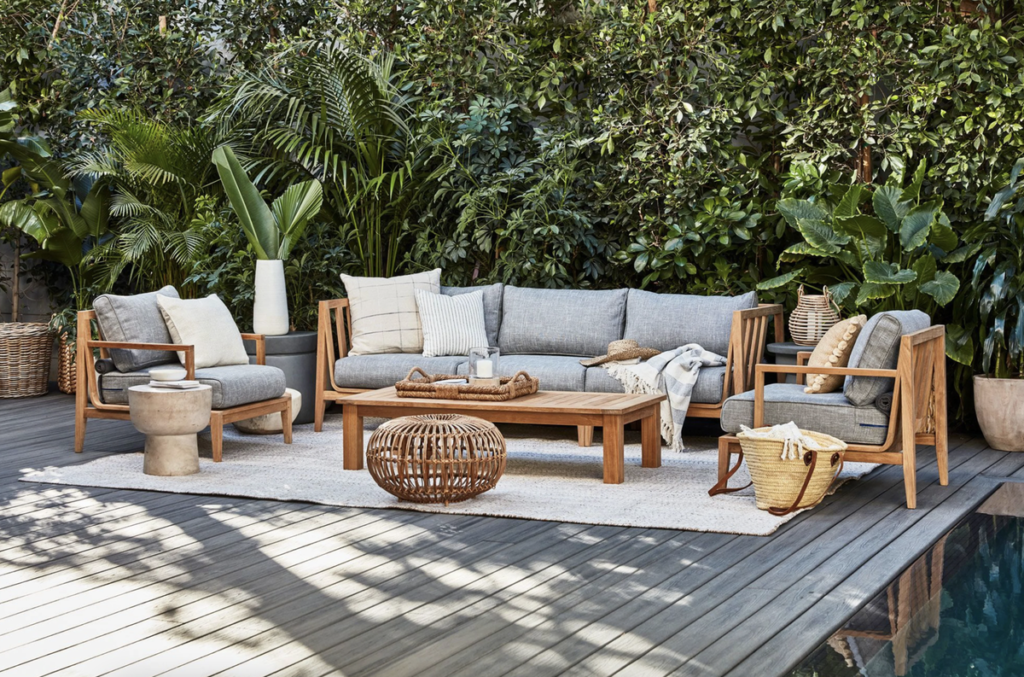Overview of Patio Umbrellas
Are you in the market for a patio umbrella and unsure of which material to choose for the frame? Look no further than steel and aluminum. Both materials have their individual benefits that make them well-suited for outdoor use. Steel is known for its durability and strength, while aluminum is lightweight and resistant to rust. In this article, we’ll explore the benefits of steel and aluminum materials so that you can make an informed decision for your ultimate outdoor relaxation space.
Benefits of Steel and Aluminum Materials
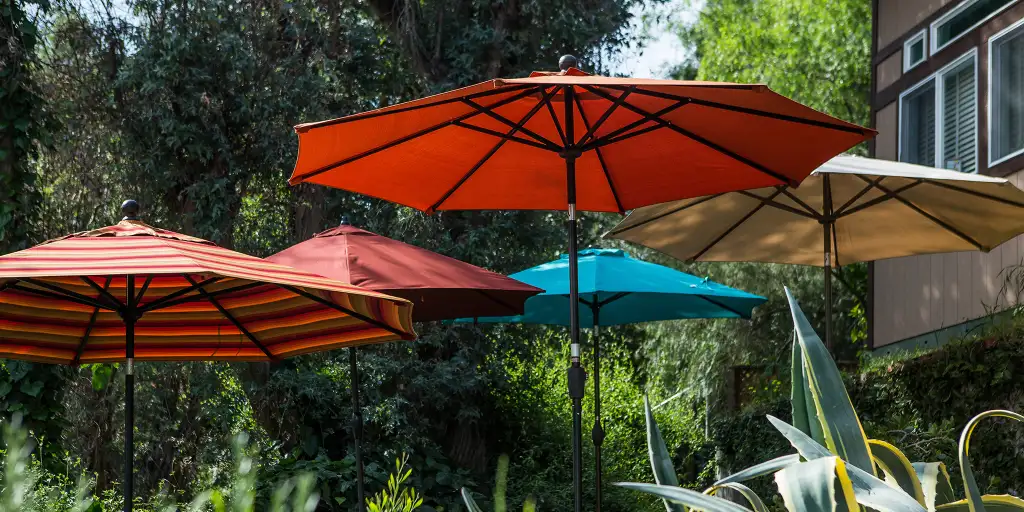
Patio umbrellas are a great way to enhance the look of your outdoor space, especially during hot summer days. When it comes to choosing patio umbrella materials, steel and aluminum are two popular choices. Here, we’ll explore the benefits of using steel and aluminum materials for patio umbrellas, how each material is preferred for different reasons, and how their unique benefits can influence the durability, maintenance, and ease of assembling the patio umbrellas.
Steel is a durable and strong material that can withstand harsh outdoor environments, such as wind gusts and inclement weather. Patio umbrellas made of steel materials are popular choices for commercial use, such as in outdoor dining areas or for event rentals. Steel frames are also more rigid, allowing for less swaying and movement during windy conditions. Moreover, steel frames can be coated to prevent rusting, prolonging the life of the patio umbrella.
On the other hand, aluminum is a lightweight material that is resistant to rust and easy to maintain. Aluminum patio umbrellas are preferred by homeowners who want to move their umbrellas around or store them easily. Due to their lightweight, aluminum frames are easier to assemble and disassemble. They also require little maintenance, as they won’t rust or corrode like steel frames.
The benefits of both steel and aluminum materials can influence the durability, maintenance, and ease of assembly of patio umbrellas. Steel patio umbrellas are strong and durable, making them ideal for withstanding harsh outdoor conditions and heavy usage. The maintenance requirements for steel umbrellas depend on the coating they have, but regular maintenance can help prolong their lifespan.
Aluminum, on the other hand, is easier to maintain, as it doesn’t rust or corrode. Additionally, aluminum frames are lightweight, making them easy to handle, move, and store. They are also easy to assemble and disassemble, which is great for those who need to store them during the off-season.
In summary, steel and aluminum are both great materials for patio umbrellas. Steel is a durable material that can withstand harsh weather conditions and heavy usage. Aluminum is lightweight and easy to maintain, making it perfect for homeowners who need to move their umbrellas around or store them easily. Choosing the best material that suits your needs can help prolong the lifespan of your patio umbrella and enhance your outdoor space.
Steel Patio Umbrellas

Steel is a popular material for constructing patio umbrellas. Steel has long been used in outdoor furniture manufacturing due to its durability and strength. In this section, we’ll discuss the main advantages and disadvantages of using steel for outdoor umbrellas. We’ll also explore the properties that make steel a desirable material, as well as some of the reasons why it might not be the best choice for everyone.
Overview of Steel Construction
Steel construction is a popular choice for constructing patio umbrellas due to its strength and durability. Raw steel is turned into umbrella poles through a process that involves heating and bending the steel into the required shape. The thickness and diameter of the steel poles are important factors in ensuring the stability of the umbrella. Thicker and larger diameter poles are less likely to bend or break, especially in windy conditions.
Steel poles are highly resistant to weather elements such as rain, wind, and sun exposure, which adds to their longevity. Weather resistance is essential for outdoor furniture, especially for patio umbrellas that are intended to provide shade and protection from harmful UV rays. Steel construction is preferred over other materials because it doesn’t rot, warp or splinter like wood, and it doesn’t corrode or rust like aluminum.
In addition to its weather resistance, steel construction offers several other benefits over other materials. Steel poles can be made into a wide variety of designs that cater to various styles and preferences. Steel is also eco-friendly, as it can be recycled and reused, reducing environmental waste.
Overall, steel construction is a reliable and durable option for outdoor umbrellas. Its strength and resistance to weather elements ensures that the umbrella will last for years to come, making it a worthwhile investment for any outdoor space.
Advantages of Steel Outdoor Umbrellas
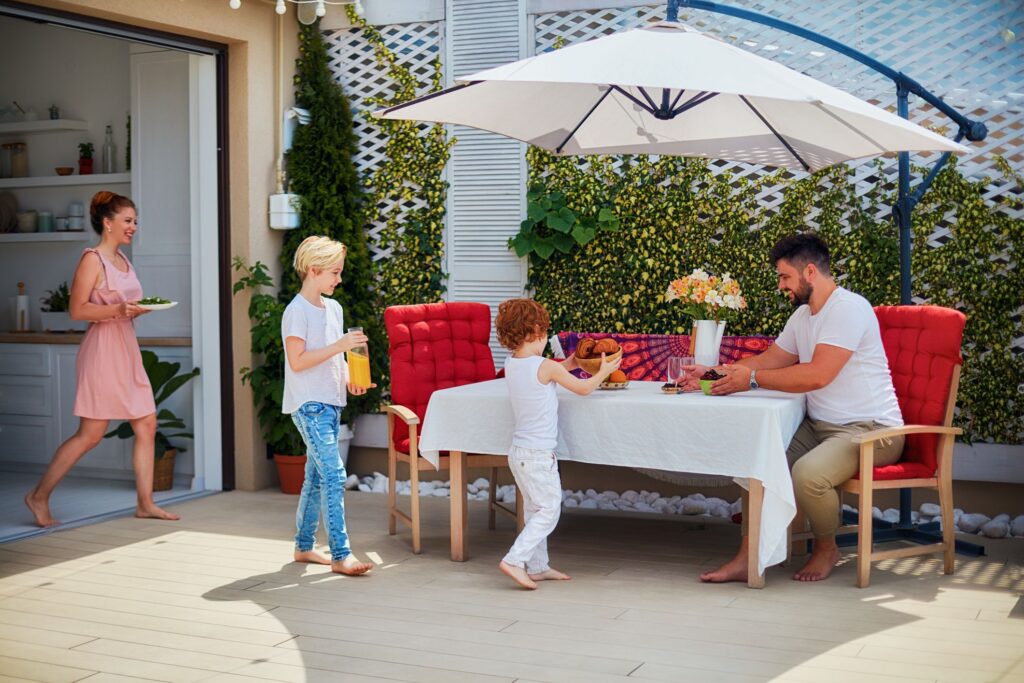
Steel construction has become increasingly popular in the production of outdoor umbrellas due to its superior strength and durability. Compared to its aluminum counterparts, steel patio umbrellas are sturdier and can support larger canopy sizes, making them a popular choice for homeowners who are looking for a long-lasting outdoor shading solution.
The benefits of using steel construction for outdoor umbrellas are numerous. One of the most significant advantages of steel is its superior strength, which is unmatched by other commonly used materials. Thick steel poles are less likely to bend or break under pressure, especially in windy conditions. This makes steel umbrellas more stable and reliable in areas where wind gusts can be an issue.
In addition to their strength, steel umbrellas are also incredibly durable. They are highly resistant to weather elements such as rain, wind, and sun exposure, which contributes to their longevity. Steel construction is preferred over other materials because it doesn’t rot, warp or splinter like wood, nor does it corrode or rust like aluminum.
Steel frames can provide additional protection against harsh weather conditions, particularly in areas with high winds or inclement weather. The robustness of steel frames inhibits them from collapsing, even under significant pressure. This extra protection assures homeowners that their outdoor umbrella will endure any weather conditions and remains functional for a longer period.
In conclusion, steel construction offers many advantages for outdoor umbrellas. Superior strength, durability, and wind resistance are just a few of the benefits that make steel umbrellas an excellent choice for any outdoor space. With additional protection against harsh weather conditions, steel patio umbrellas are a popular option for homeowners looking to invest in a long-lasting and reliable outdoor shading solution.
Disadvantages of Steel Patio Umbrellas
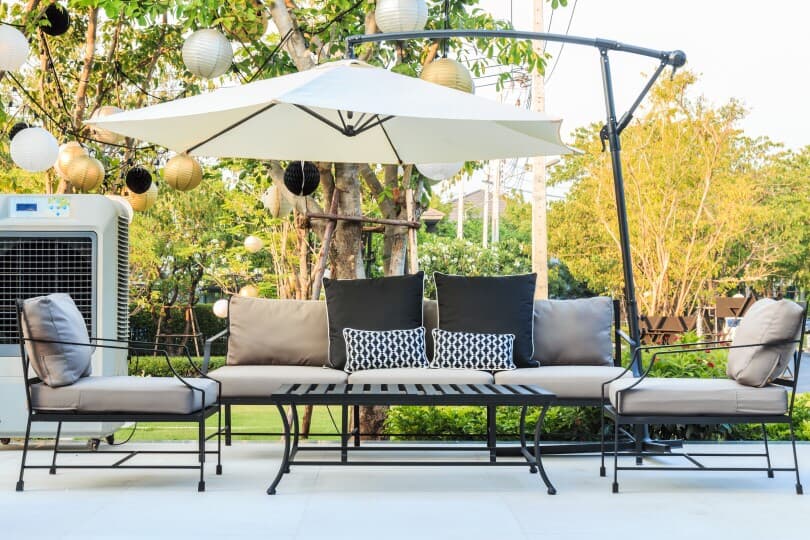
Although steel patio umbrellas offer plenty of benefits, they also come with some disadvantages. Steel may add an elegant and classic look to your outdoor space, but it is prone to rust and corrosion, reducing the lifespan of the umbrella. This weakness makes the umbrella less durable under inclement weather conditions such as rain or snow.
Moreover, steel umbrella frames are heavier compared to their aluminum counterparts, which makes them more difficult to move around. This heavyweight also makes the umbrella less stable in windy conditions, limiting its functionality in areas with high wind gusts.
Another disadvantage of steel patio umbrellas is their limited options for colors and canopy fabrics. Steel frames are not suitable for a wide range of colors and styles, which may make it challenging to find the perfect umbrella to match your patio furniture and outdoor décor.
Finally, since steel is a denser material, it is more likely to conduct heat, making it an unsuitable option for areas with hot weather. If you live in a place with high temperatures, steel patio umbrellas are not the best option, as they won’t keep you adequately shaded and cooled off.
In conclusion, steel patio umbrellas may have a classic and elegant look, but they come with several drawbacks. Rust and corrosion, heavyweight, limited color options, and unsuitability for hot areas are some of the disadvantages of steel patio umbrellas. When choosing the right umbrella for your outdoor space, be sure to weigh up the benefits and disadvantages of steel against other materials before making your decision.
Aluminum Patio Umbrellas
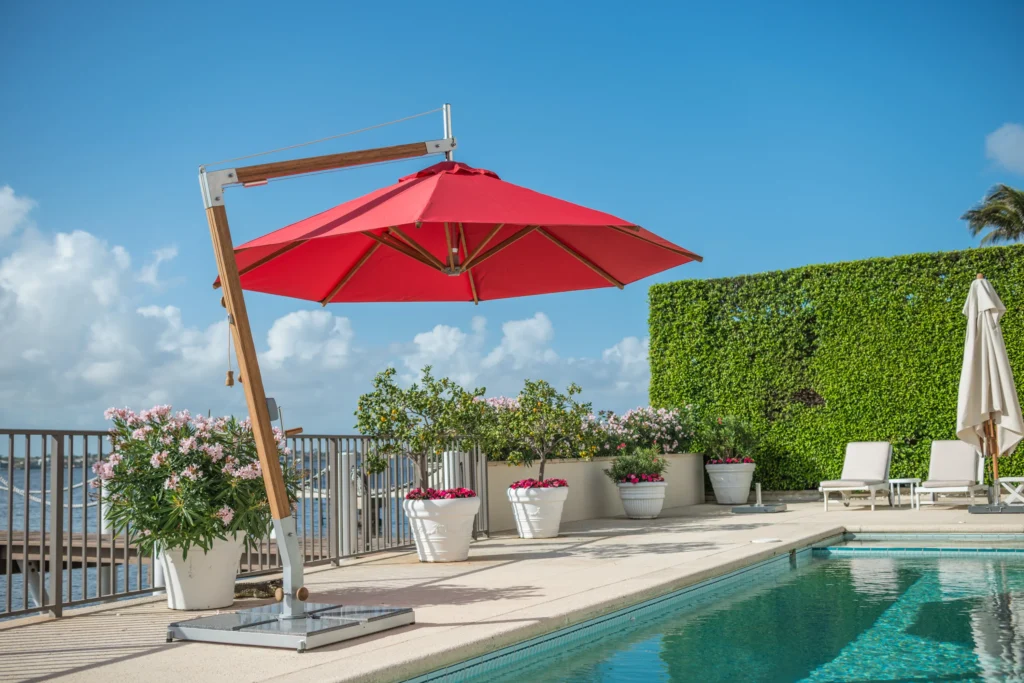
Aluminum construction has become a popular choice for outdoor umbrellas due to its durability and versatility. With its lightweight and sturdy frame, aluminum patio umbrellas offer ample shade and protection from the sun’s harmful rays. In addition, aluminum is resistant to corrosion, making it a great option for outdoor furniture that may be exposed to various weather conditions. Though aluminum umbrellas have many advantages, there are some drawbacks to consider, including their susceptibility to wind damage and their higher cost compared to other materials. Read on to discover the benefits and drawbacks of aluminum patio umbrellas.
Overview of Aluminum Construction
Aluminum construction is a popular choice for outdoor patio umbrellas due to its unique characteristics. Aluminum is formed through a process known as extrusion, in which heated aluminum is passed through a die. This results in a lightweight and durable frame material that is both corrosion-resistant and has an anti-UV coating to protect against the harsh rays of the sun.
One of the essential features of aluminum construction is its lightweight nature. This makes aluminum umbrellas easy to move and set up, providing a hassle-free outdoor experience. In addition, aluminum is highly durable, making it ideal for outdoor furniture that will be exposed to various weather conditions.
Compared to other materials, such as steel or wood, aluminum is a more preferred choice for patio umbrellas. Its rust-resistant properties and overall durability make it a long-lasting investment for any outdoor space.
There are various types of aluminum frames catering to the needs of various consumers. One option is market umbrellas, featuring a more traditional style design with a center pole. Cantilevered umbrellas have off-center poles that open up the space under the umbrella, providing ample shade for outdoor dining or lounging. Fiberglass umbrellas offer more flexibility in windy conditions, while wood-stemmed umbrellas provide a unique aesthetic for outdoor spaces.
In summary, aluminum construction offers a range of benefits for patio umbrellas, making it a popular choice among consumers. Its lightweight, durable, and corrosion-resistant properties make it a long-lasting investment for any outdoor space. Additionally, the variety of aluminum frames available allows for customization and suitability for any needs.
Advantages of Aluminum Outdoor Umbrellas
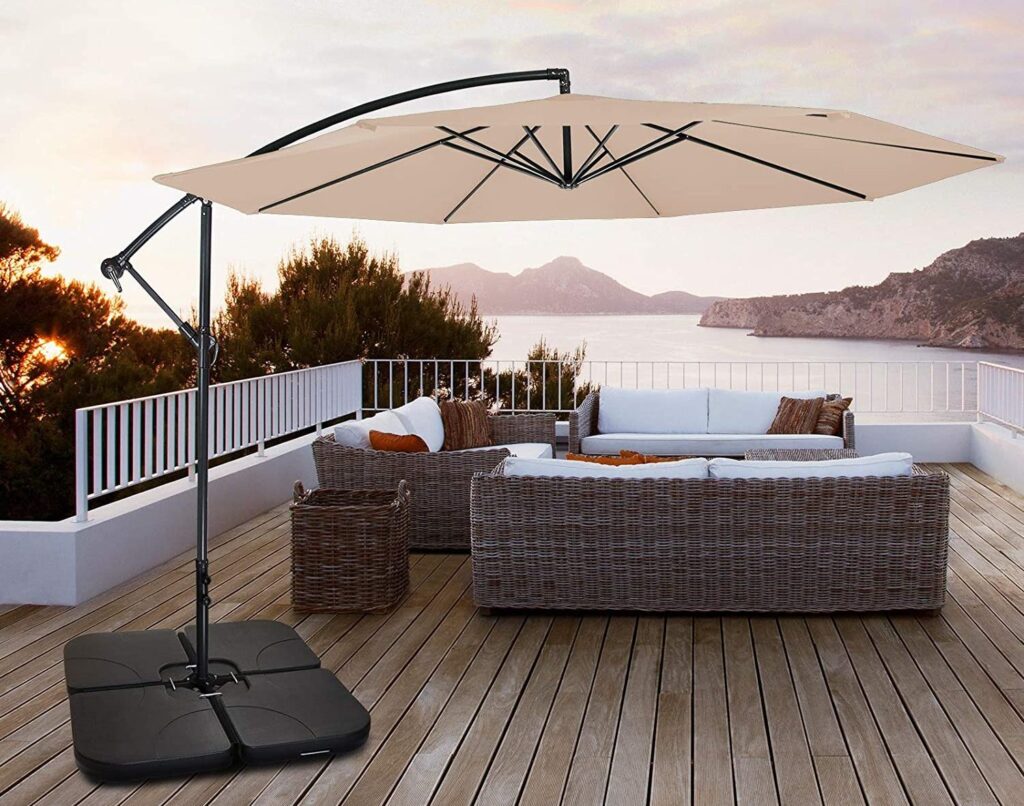
When it comes to outdoor patio umbrellas, the material used for construction makes a significant difference in its overall performance and durability. Aluminum is a popular choice for outdoor umbrellas due to its many advantages over other materials.
Aluminum material is known for its durability and resistance to weather. The corrosion-resistant properties of aluminum allow for it to withstand harsh weather conditions and remain intact for long periods. Additionally, aluminum outdoor umbrellas are lightweight, making them easy to move around and set up, unlike other options such as steel or wood.
Another advantage of aluminum umbrellas is their affordability. Aluminum is less expensive compared to other materials, while still offering the same level of durability and longevity. This makes it an excellent option for customers who want a long-lasting but affordable patio umbrella.
Furthermore, aluminum umbrellas offer customization options that are not available in other materials, including a range of frame colors, tilt mechanisms, and fabric choices. These choices allow customers to purchase an umbrella that complements their outdoor space while ensuring they have everything they need from the umbrella.
In addition to the above advantages, aluminum umbrellas provide added protection against uv rays, which can be harmful to humans and outdoor furniture alike. The material used in aluminum umbrellas has an anti-uv coating that helps to block out the sun’s harmful rays, making it a great option for areas experiencing inclement weather.
In summary, the advantages of aluminum outdoor umbrellas include durability, weather resistance, affordability, light weight, and a range of customization options. With these benefits, aluminum umbrellas make a practical, long-lasting, and cost-effective choice for any outdoor space.
Disadvantages of Aluminum Patio Umbrellas

While aluminum patio umbrellas have many benefits, there are also some potential drawbacks to consider. One of the main concerns is their durability in extremely windy conditions. While aluminum frames are generally weather-resistant and have a strong-to-weight ratio, they may not hold up as well as steel frames in high winds.
Another potential issue with aluminum umbrellas is their long-term strength. Over time, aluminum frames may bend or warp, which can affect their stability and safety. This is especially true if the umbrella is frequently exposed to harsh weather conditions or if it’s not stored properly during the off-season.
In terms of aesthetics, aluminum frames may have a more limited range of color options compared to steel frames. While aluminum frames can be painted, the color options are generally more limited and may not be as vibrant or customizable as steel frames.
Finally, cost may also be a potential drawback to consider when choosing an aluminum patio umbrella. While aluminum frames are generally more affordable than other materials such as wood or fiberglass, they may be slightly more expensive than steel frames. However, it’s important to consider the long-term value and durability of the umbrella before making a decision based solely on cost.
In conclusion, while aluminum umbrellas have many benefits, they may not be the most durable option in extremely windy conditions, and their frames can bend or warp over time. The range of color options may be more limited than steel, and they may be slightly more expensive. Consider these potential drawbacks when choosing the best material for your patio umbrella.
Comparison Between Steel and Aluminum Patio Umbrallas
When it comes to choosing the perfect patio umbrella for your outdoor space, material is an important factor to consider. Steel and aluminum are two of the most popular choices for umbrella frames, each with their own unique advantages and drawbacks. In this section, we will explore the cost differences between the two materials, the durability differences between the two materials, and the maintenance requirements for steel and aluminum patio umbrellas.
Cost Differences Between the Two Materials
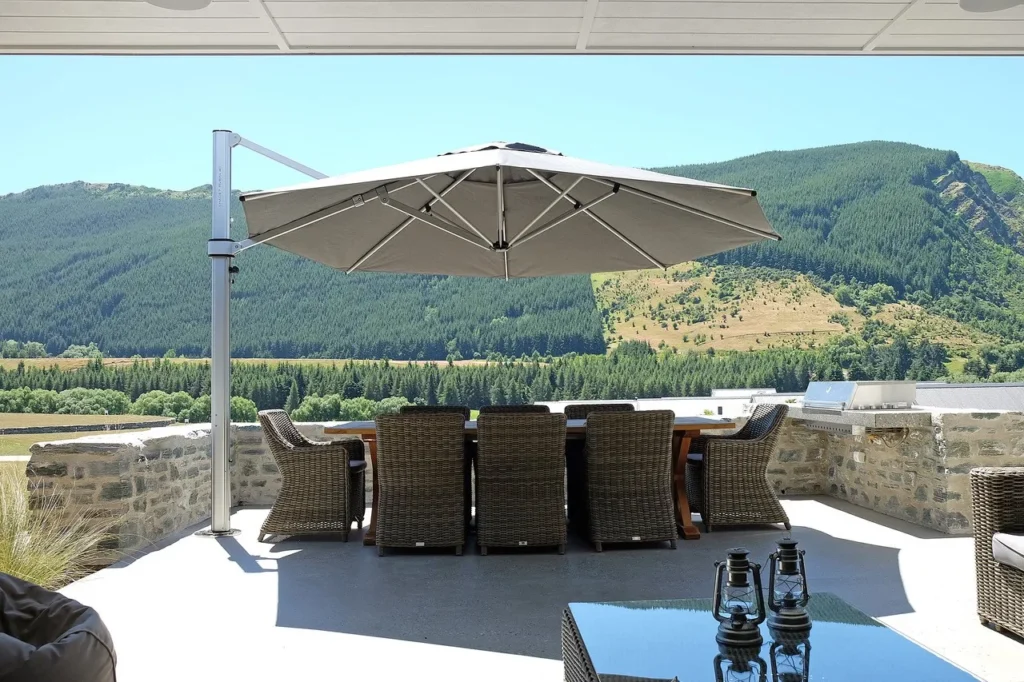
One of the primary considerations when choosing between steel and aluminum patio umbrellas is the cost. Steel is generally less expensive than aluminum, but there are many factors that can affect the price of both materials.
The quality of construction is one such factor, with higher quality frames and canopies typically costing more. In addition, the size of the canopy can also impact the cost, with larger umbrellas costing more than smaller ones. If additional features are included, such as UV protection, the cost may also be higher.
Some of the top market options for steel patio umbrellas include the Abba Patio Outdoor Patio Umbrella and the Sunnyglade 9′ Solar LED Lighted Patio Umbrella, which are both priced below $100. On the higher end, the Le Papillon 15-ft Double-Sided Outdoor Patio Umbrella and the Tangkula 10ft Outdoor Patio Umbrella are priced at around $300.
For aluminum patio umbrellas, some popular options at lower price points include the TropiShade 9′ Market Umbrella and the Sunnyglade 9′ Solar LED Lighted Patio Umbrella. Higher-end options include the Abba Patio Outdoor Patio Umbrella with a built-in fan and the PHI VILLA Outdoor Patio Umbrella, priced at around $400.
Overall, the price range for patio umbrellas made of steel or aluminum can vary widely depending on size, quality, and additional features. As a general guideline, steel patio umbrellas tend to be less expensive than aluminum, ranging from around $50 to $300, while aluminum patio umbrellas typically range from around $70 to $400. When shopping for a patio umbrella, it’s important to consider your budget and what features are most important to you in order to find the best option for your needs.
Durability Differences Between the Two Materials
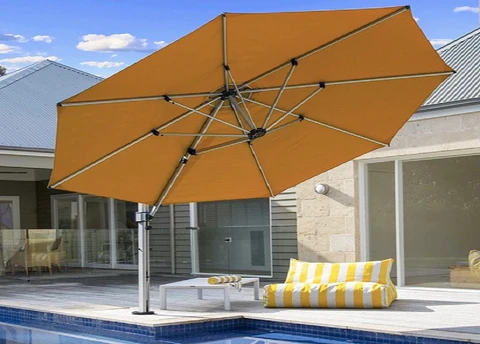
When it comes to durability differences between steel and aluminum patio umbrellas, both materials have their own unique qualities that make them a better choice for certain outdoor conditions.
Steel is known for its strength and durability, making it a good option for harsh weather conditions such as strong winds and wind gusts. It can withstand more pressure and force than aluminum, which can be beneficial in areas prone to inclement weather. However, steel is also heavy and can be difficult to move around, making it less practical for those who require a more mobile option.
On the other hand, aluminum is lightweight and easy to move, making it a better option for those who require a more portable choice. It’s also resistant to rust and corrosion, which increases the overall lifespan of the umbrella. However, aluminum may not be as strong as steel, so it may not withstand severe weather conditions as well as its counterpart.
Aside from the material, the durability of both steel and aluminum patio umbrellas can also be affected by other factors such as the quality of the canopy fabric and the overall design. High-quality canopy fabrics can provide additional protection against the elements and increase the longevity of the umbrella, while a sturdy and well-designed frame can offer additional support and increase the overall durability of the product.
In conclusion, when considering the durability differences between steel and aluminum patio umbrellas, it’s important to take into account the specific outdoor conditions where the umbrella will be used. Steel is a better choice for harsh weather conditions, while aluminum is more practical for those who require a more portable option. However, additional factors such as the canopy fabric and overall design can also play a role in increasing the durability of either material.
Maintenance Requirements for the Two Materials
When it comes to maintaining your patio umbrella, both steel and aluminum materials have their own unique requirements to ensure optimum longevity.
Steel outdoor umbrellas require regular maintenance to prevent rust and corrosion from developing over time. To accomplish this, simply wiping the umbrella with a damp cloth can keep the metal surface clean. Additionally, it’s crucial to remove the canopy and store it during heavy wind or rain to prevent damage. Failing to remove the canopy during periods of inclement weather can lead to significant wear and tear on the umbrella and ultimately shorten its lifespan.
In contrast, aluminum patio umbrellas are more low-maintenance due to their resistance to rust and corrosion. To keep it looking new, one can use a garden hose and mild soap to clean its surface. And like its steel counterpart, the canopy should also be stored during periods of strong winds or rain.
Regardless of which material a patio umbrella is made from, proper maintenance is key to ensuring its longevity. Regular cleaning and timely removal of the canopy during harsh weather conditions can significantly extend the lifespan of the product and make outdoor living more enjoyable.
Tips for Choosing a Patio Umbrella
When choosing a patio umbrella, there are a number of factors to consider to ensure you make the best decision for your outdoor space. Here are some tips to keep in mind:
First, it’s important to choose a patio umbrella that fits with your backyard decor style. This will ensure that it complements and enhances the overall aesthetic of your outdoor space. Additionally, you’ll want to make sure that the umbrella is sized appropriately for the space you have available. Consider the dimensions of your patio table or other outdoor furniture to ensure that the umbrella canopy will provide ample shade and coverage.
Durability and weather resistance are also key factors to consider. You’ll want to choose an umbrella made from durable materials that can withstand inclement weather conditions. For example, steel and aluminum are both popular choices for umbrella poles, as they are strong and resistant to rust and corrosion.
When selecting a canopy fabric, look for options with high-quality UV protection that will help shield you and your guests from harmful sun rays. Acrylic and Sunbrella fabrics are both popular choices due to their durability and ability to withstand harsh weather conditions.
Another important consideration is the style of umbrella you want. There are two main types: cantilever patio umbrellas and standard market umbrellas. Cantilever umbrellas have a freestanding design and can be adjusted to tilt to provide shade throughout the day. Market umbrellas, on the other hand, are designed to be installed through the center of a patio table and can also come with a crank lift for easy opening and closing.
By taking these factors into account, you can select the perfect patio umbrella for your outdoor space that will be both functional and stylish. Remember to think carefully about the size, materials, style, and canopy fabric to ensure that you make the best choice for your needs.

